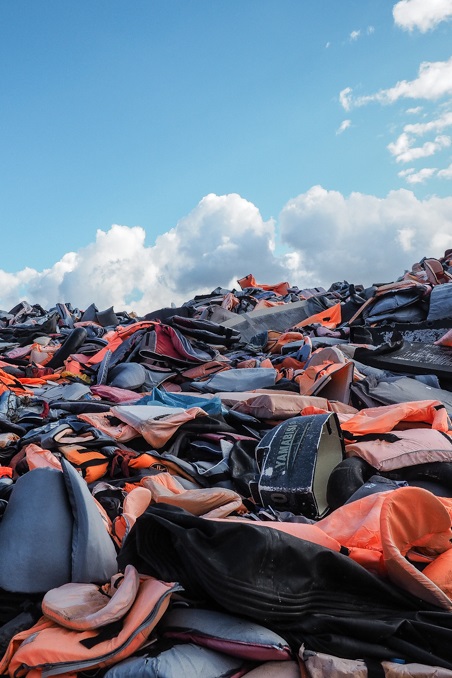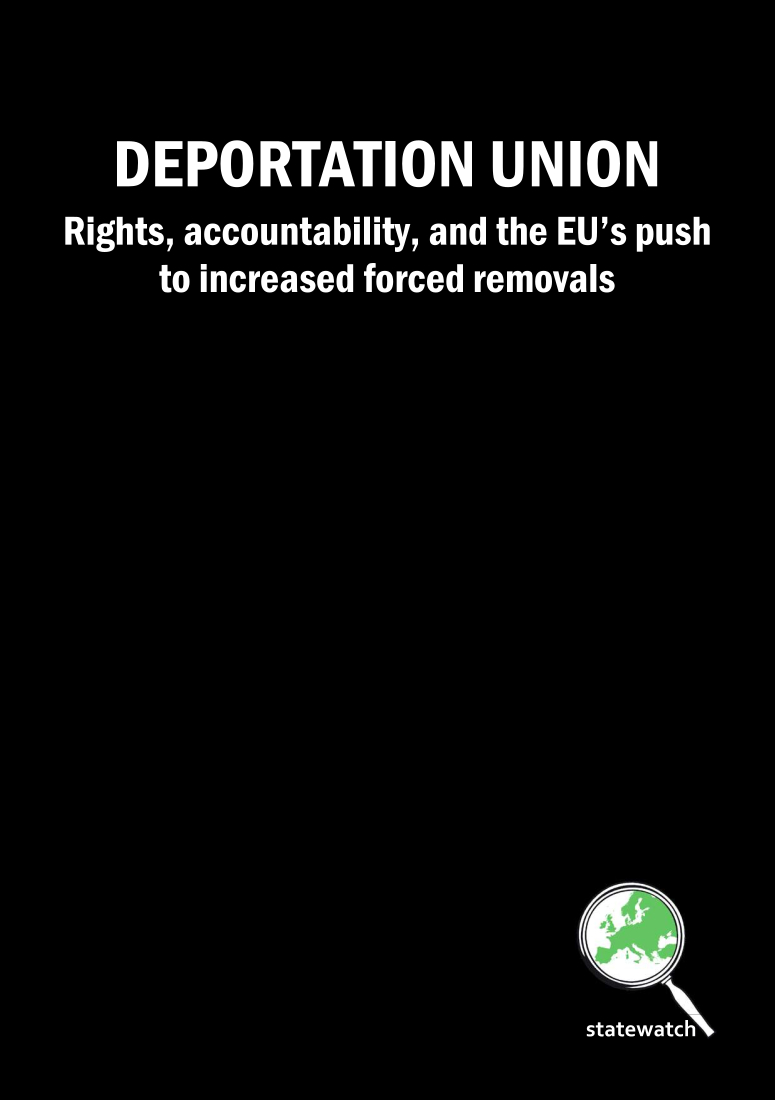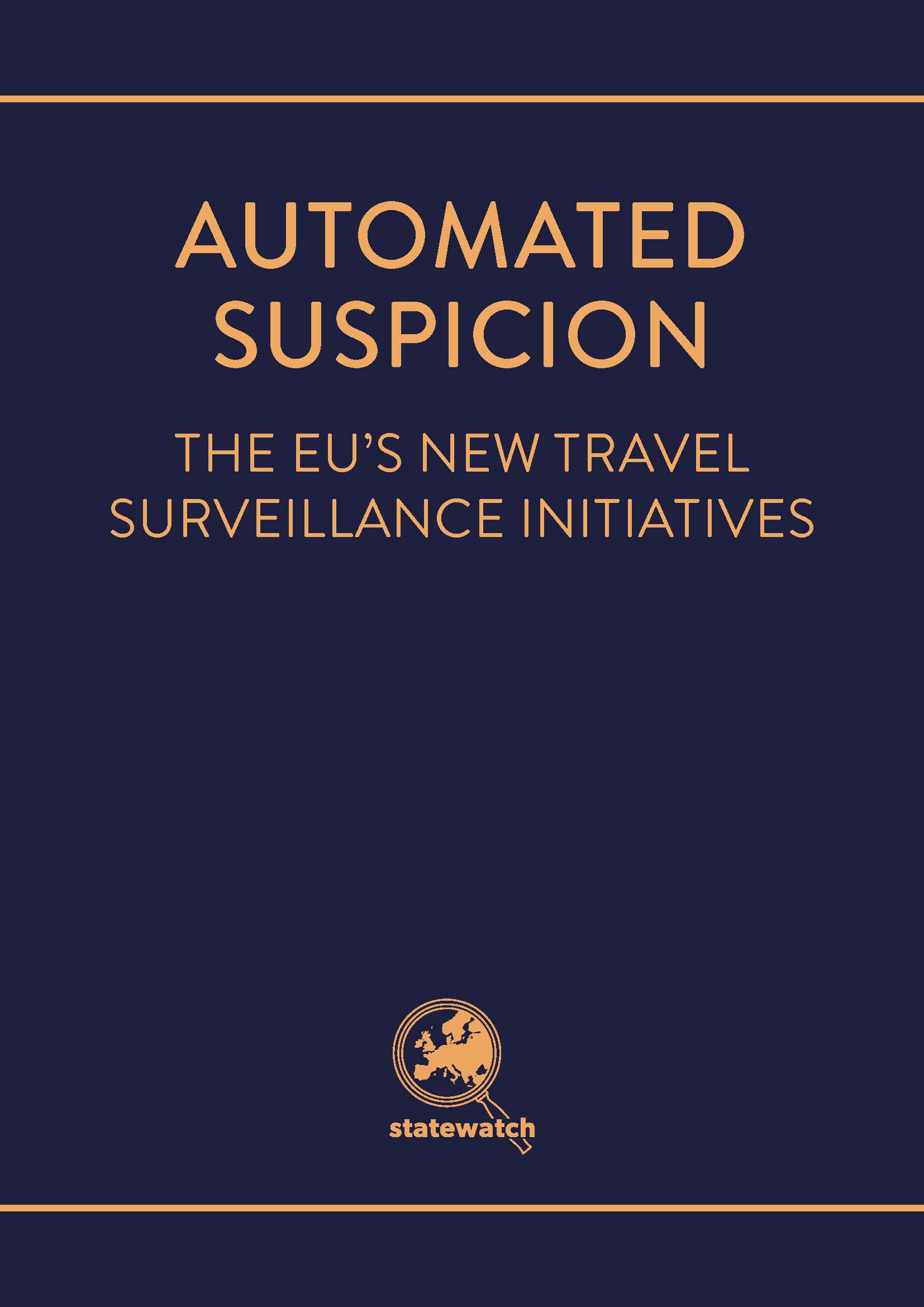Analyses

Pushback practices and their impact on the human rights of migrants
Submission by Statewatch to the UN Special Rapporteur on the human rights of migrants.

No more Morias? Notes from the field and the EU responses
The burning of Moria camp seemed like an exceptional tragedy. But this event and the EU response to it reflect a decades-long policy approach. As long as securitization remains the guiding principle of EU migration policy, the calls of Moria will remain unanswered.
Frontex: an overview
An article produced for the Migration Control project, providing a critical overview of the role, powers and activities of EU border agency Frontex, from 2004 to the present.
Albania: dealing with a new migration framework on the edge of the empire
In 2014, Albania was formally accepted as a candidate for membership to the EU. The country is aiming to approximate its domestic law with the EU legal 'acquis' within the next two years, prompting big changes in the country's immigration and asylum system - at least on paper. Currently, those systems cannot be said to meet fundamental rights or EU legal standards, but given conditions within the EU itself - notably in Greece - it remains to be seen whether this will be a barrier to Albania joining the bloc.
Atlantic Moria in the making in overcrowded Gran Canaria camp
The arrival of 15,000 people in the Canary Islands has led to what is by now the customary response from the EU and its member states: reinforce control measures, step up deportations and accommodate people in unsuitable and unsanitary conditions. It seems that little has been learned from the humanitarian disasters in states such as Italy and Greece. Until the EU introduces humane migration policies and addresses the political economy underlying migration from countries such as Senegal, those disasters seem likely to be repeated.
EU military mission aids pull-backs to Libya, with no avenues for legal accountability
An EU military operation is assisting the Libyan Coast Guard in ‘pull-backs’ of people trying to cross the Mediterranean, by providing information on the location of boats in distress. Despite admitting that Libya is not a safe country in which to disembark people, the EU argues that it is acting according to international law. Legal experts say otherwise, but given the complex legal structure of EU security and defence missions, holding anyone accountable for this assistance with ‘pull-backs’ may prove difficult.
Viewpoint: The legal and illegal businesses of Fortress Europe
Border controls are big business - for the companies supplying the fences, technology and equipment used to put them in place, and for the smugglers who seek to circumvent them, argues Ana González-Paramo.
First analysis of the EU’s new asylum proposals
Professor Steve Peers (Law School, University of Essex) gives an overview of the proposals published as part of the EU's new Pact on Migration and Asylum.

Deportation Union: Rights, accountability and the EU's push to increased forced removals
Deportation Union provides a critical examination of recently-introduced and forthcoming EU measures designed to increase the number of deportations carried out by national authorities and the European Border and Coast Guard Agency, Frontex. It focuses on three key areas: attempts to reduce or eliminate rights and protections in the law governing deportations; the expansion and interconnection of EU databases and information systems; and the increased budget, powers and personnel awarded to Frontex.
Viewpoint: COVID-19: from "smart" to "smarter" borders?
An article in Border Security Report, a magazine aimed at those from the public and private sectors working on border security, argues that the COVID-19 pandemic will accelerate the adoption of "smarter" borders and that three key technologies that will underpin the shift. Can ever-more intrusive data-gathering and processing provide a way out of lockdowns and quarantines? If it could, would it be desirable?

Automated suspicion: The EU's new travel surveillance initiatives
This report examines how the EU is using new technologies to screen, profile and risk-assess travellers to the Schengen area, and the risks this poses to civil liberties and fundamental rights. By developing ‘interoperable’ biometric databases, introducing untested profiling tools, and using new ‘pre-crime’ watchlists, people visiting the EU from all over the world are being placed under a veil of suspicion in the name of enhancing security.
Spain/Portugal/Italy: Partial relief: migrant regularisations during the COVID-19 pandemic
The uncertainty that the Covid-19 outbreak has brought to every sphere of life has had a major impact on already vulnerable groups, such as undocumented migrants. People who, for whatever reason, lack official authorisation to stay, live and work in a particular state usually live with constant fear of being detained or receiving an expulsion order after a spontaneous stop by the police. Among the different measures approved by European countries under states of emergency, some have addressed the situation of migrant populations.
EU: Guns, guards and guidelines: reinforcement of Frontex runs into problems
An internal report circulated by Frontex to EU government delegations highlights a series of issues in implementing the agency’s new legislation. Despite the Covid-19 pandemic, the agency is urging swift action to implement the mandate and is pressing ahead with the recruitment of its new ‘standing corps’. However, there are legal problems with the acquisition, registration, storage and transport of weapons. The agency is also calling for derogations from EU rules on staff disciplinary measures in relation to the use of force; and wants an extended set of privileges and immunities. Furthermore, it is assisting with “voluntary return” despite this activity appearing to fall outside of its legal mandate.
Mediterranean: As the fiction of a Libyan search and rescue zone begins to crumble, EU states use the coronavirus pandemic to declare themselves unsafe
The search and rescue zone assigned to Libya in the central Mediterranean has been obvious since its inception as a fiction that was useful to assert EU efforts to reduce the number of arrivals by sea. Shortly after a submission to the International Maritime Organization (IMO) was filed in late March 2020, calling for it to be scrapped for not fulfilling the relevant requirements, attempted sea crossings from Libya resumed. EU states responded by opportunistically declaring themselves unsafe due to the Covid-19 emergency.
EU/Greece/Turkey: Crisis not averted: security policies cannot solve a humanitarian problem, now or in the long-term
At the end of February, the Turkish government announced it would allow refugees to travel onwards to Greece and Bulgaria, in the hope of extracting from the EU further financial support as well as backing for its military operations in Syria. It has now taken up its role as Europe’s border guard again, but the manufactured crisis induced by the Turkish decision and the EU response highlight the long-term failings of the EU’s asylum and migration model.
Spain: Migrants’ rights must be guaranteed and put at the core of measures taken by the government
This article is a translation of a ‘decalogue’ of proposals made by Spanish organisations that are members of Migreurop to the Spanish government. The introductory text is a translation of the announcement that accompanied the Decalogue. Statewatch is a member of the Migreurop network. [1]
Italy renews Memorandum with Libya, as evidence of a secret Malta-Libya deal surfaces
The 2017 Memorandum of Understanding (MoU) between Italy and Libya was tacitly renewed without amendments on 2 February 2020, amid widespread criticism over its legality and effects since October 2019. This article outlines the parliamentary debate that accompanied the interior minister’s declared intention to renew the MoU in November 2019.
Anti-migration cooperation between the EU, Italy and Libya: some truths
Apart from a regression in human rights standards that immigration policy is producing within the EU’s borders by promoting racism in politics and institutional discrimination in pursuit of its strategic objectives, the effects of EU migration policy’s externalisation to third countries are also harmful.
Frontex launches “game-changing” recruitment drive for standing corps of border guards
On 4 January 2020 the Management Board of the European Border and Coast Guard Agency (Frontex) adopted a decision on the profiles of the staff required for the new “standing corps”, which is ultimately supposed to be staffed by 10,000 officials. [1] The decision ushers in a new wave of recruitment for the agency. Applicants will be put through six months of training before deployment, after rigorous medical testing.
Spotted an error? If you've spotted a problem with this page, just click once to let us know.